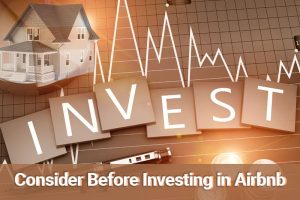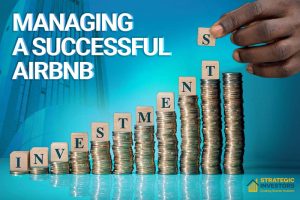
In the ever-evolving world of real estate investments, Airbnb has emerged as a lucrative alternative to traditional long-term rentals. The potential for higher returns and the ability to cater to diverse guest demographics make it an attractive option for those looking to invest in Airbnb. But how do you navigate the intricacies of this market and maximize your investment? In this blog post, we’ll explore the pros and cons of investing in the 2024 Australian Airbnb market, key factors to consider before deciding to invest in Airbnb, and tips for managing a successful Airbnb investment.
Key Takeaways
- Investing in Airbnb properties offers potential investors the opportunity to earn high rental income, gain flexibility for hosts and diversify their portfolios.
- Careful budgeting and expense management is essential as increased expenses must be taken into account, local laws should be researched to avoid regulatory issues, and strategies implemented to reduce risk of inconsistent income.
- Location analysis is key when selecting a profitable property type, financing options need careful consideration, while pricing strategies & guest experience are important for successful investment management.
Understanding Airbnb Investments

Gaining insights into the Airbnb platform in Australia is vital for investors aiming to profit from it.
How Airbnb Operates in Australia
As one of the most popular short-term rental platforms, Airbnb operates as an online marketplace in Australia catering to a diverse range of user demographics. International tourists, domestic travelers, and even locals looking for a weekend getaway use the platform to find unique and personalized short-term rental accommodation experiences.
Property owners list their properties on the platform, and as an Airbnb host, they earn rental income by providing accommodations for these guests. The demand for Airbnb rentals can be influenced by factors such as location, seasonality, and nearby amenities. By offering a well-maintained and attractive Airbnb rental, property owners can maximize their rental income potential.
For success in this market, real estate investors need to familiarize themselves with local Airbnb rules and regulations pertaining to short-term rentals by examining local government websites, the Chamber of Commerce website, and other online sources.
Types of Airbnb Properties
Airbnb offers a wide range of Airbnb rental property types for investment, including:
- Townhomes
- Condos
- Detached single-family homes
- Duplexes
- Complex units
- Unique accommodations such as treehouses and yurts
The profitability of these property types depends on factors such as location, demand, and the features they offer.
Choosing the right property type for your Airbnb investment requires considering the market’s nature and the type of guests your property will appeal to. For example, small apartments or condos located in bustling city centers may be ideal for business travelers, while single-family homes may be more suitable for families or groups of friends on vacation. Consult with real estate professionals to help guide you in selecting a suitable property for your Airbnb investment, keeping in mind the regulations surrounding primary residence.
Pros of Investing in Airbnb Properties

Let’s explore some of the pros of investing in this market, including high rental income potential, flexibility for hosts, and diversification of investment portfolios.
High Rental Income Potential
One of the main attractions of investing in Airbnb properties is the potential for high rental income. Due to higher nightly rates and demand for short-term rentals, Airbnb rentals may generate more income than traditional long-term rentals. In fact, by offering unique and personalized experiences for guests, Airbnb hosts can charge premium rates, resulting in a higher rental yield.
However, bear in mind that factors such as occupancy rates, nightly rates, and seasonality can influence the potential for high rental income. Keep your Airbnb investment profitable by researching competition, adjusting rates according to demand, and offering discounts for longer stays.
Flexibility for Hosts
Another advantage of investing in Airbnb properties is the flexibility it offers hosts. Property owners have the ability to customize their rental prices, availability, and property management preferences. This flexibility means that hosts can:
- Modify their listings based on market demand
- Adjust their prices to attract more guests during peak seasons or local events
- Block off dates for personal use or maintenance
- Choose their preferred level of involvement in managing the property
This level of control allows hosts to maximize their earnings and tailor their hosting experience to their specific needs and circumstances.
Furthermore, short-term rentals provide hosts with the opportunity to:
- Rent out their property at their discretion, which may not be possible with traditional long-term tenants
- Maximize rental income
- Adapt to changes in the market or their personal lives more easily
This flexibility can help hosts make the most of their rental property.
Diversification of Investment Portfolio
Investing in Airbnb properties offers investors the opportunity to:
- Diversify their investment portfolio
- Allocate funds into various types of properties and locations
- Minimize risk and potentially maximize returns
- Provide a safety net against market fluctuations
Diversification is particularly important for property investors in the ever-changing world of real estate investments.
For instance, investing in both traditional long-term rentals and Airbnb properties can balance the risk associated with each type of investment. If the Airbnb market faces a downturn, traditional rentals can provide a more stable income source, and vice versa. This diversification strategy can help ensure a more consistent cash flow, making your investment portfolio more resilient in the long run.

Cons of Investing in Airbnb Properties

Increased expenses are one of the main drawbacks of investing in Airbnb properties. These expenses can include a medical bill.
Increased Expenses
Investing in Airbnb properties often comes with increased expenses compared to traditional long-term rentals. These expenses may include:
- Platform fees
- Property setup costs (such as furniture and appliances)
- Higher insurance premiums
- Ongoing maintenance costs
Moreover, hosts need to factor in the following costs:
- The cost of cleaning services between guest stays, which can be a significant expense depending on the frequency of bookings.
- Some of these costs can be passed on to guests in the form of a cleaning fee.
- It’s important to ensure that the overall price remains competitive in the market to attract bookings.
Careful budgeting and expense management are crucial for maintaining a profitable Airbnb investment.
Regulatory Issues
Regulatory issues can have a significant impact on the success of your Airbnb investment. Local laws and restrictions on short-term rentals can vary greatly, potentially limiting the number of days an Airbnb property can be rented out or imposing specific rules and regulations that must be adhered to.
Failure to comply with these regulations can result in fines, legal disputes, and even the loss of your Airbnb listing. Therefore, it’s crucial to thoroughly research and understand the local laws and regulations pertaining to short-term rentals in the area where you plan to invest.
Inconsistent Income
One of the biggest risks associated with Airbnb investments is inconsistent income. Occupancy rates can fluctuate based on seasonality, market demand, and even your property’s reputation or online reviews. This means that your rental income may vary significantly from month to month, making it difficult to predict and budget for expenses.
To mitigate this risk, it’s essential to:
- Maintain a high-quality property
- Provide exceptional guest experiences
- Implement effective pricing strategies to maximize occupancy rates and rental income
By doing so, you can minimize the impact of inconsistent income on your overall investment returns.
Key Factors to Consider Before Investing in Airbnb

This section will cover location analysis, property type selection, and financing options, all of which are important factors when contemplating an Airbnb property investment.
Location Analysis
Location analysis is a critical factor in determining the success of your Airbnb investment. Here are some steps to help you make informed decisions when selecting a property to invest in:
- Research the local market to ascertain the average nightly rate for similar properties.
- Determine the demand for Airbnb rentals in the area.
- Assess the competition from other Airbnb hosts.
Identifying high-demand areas and potential rental income can greatly contribute to the success of your investment.
Utilize tools such as Mashvisor’s Airbnb analytics platform to identify areas of high Airbnb demand and gain valuable insights into the local market. By conducting a thorough location analysis, you can ensure that your investment is well-positioned to capitalize on the demand for short-term rentals in the area.
Property Type Selection
Choosing the appropriate property type for your Airbnb investment is crucial to reach your intended market and maximize your investment returns. Factors to consider include the nature of the market, the type of guests the property will attract, and local demand for short-term rentals.
Consult with real estate professionals to help guide you in selecting a suitable property for your Airbnb investment. By choosing a property type that aligns with your target guests and the local demand, you can increase the likelihood of achieving high occupancy rates and consistent rental income.
Financing Options
Financing options for Airbnb investments may differ from traditional home loans, requiring higher down payments and interest rates. When financing an Airbnb investment property, factors such as:
- the required minimum down payment
- premium mortgage insurance (PMI) requirements
- interest rate
- loan term
- all other conditions
Must be taken into consideration.
There are several financing options available for purchasing an Airbnb investment property, including:
- Conventional mortgages
- FHA loans
- Hard money
- Home equity lines of credit (HELOC)
Explore these financing options and choose the one that best suits your financial situation and investment goals.
Tips for Managing a Successful Airbnb Investment

This section will delve into pricing strategies, guest experience, and property management solutions that can enhance your investment returns.
Pricing Strategies
Implementing effective pricing strategies is crucial for optimizing your Airbnb investment. Research the competition, adjust your rates based on market demand, and offer discounts for extended stays to attract more bookings and generate higher rental income.
Utilize dynamic pricing tools to set Airbnb prices, taking into consideration factors such as the time of year, the day of the week, and the demand for Airbnb rentals in the area. By employing effective pricing strategies, you can ensure your Airbnb property remains competitive in the market and maximizes your rental income.
Tax considerations
Rental property owners are eligible for tax deductions on expenses incurred related to the property while it is being rented out or available for rent. Moreover, if your property is negatively geared, meaning the deductible expenses exceed the rental income, you can use this loss to reduce your overall taxable income.
Bear in mind that you may need to pay capital gains tax when you sell your investment property and realize a profit. Consulting with a tax professional is prudent to ensure comprehension of tax implications and maximize any relevant tax benefits.
Guest Experience
Delivering an exceptional guest experience is key to maintaining high occupancy rates and garnering positive reviews for your Airbnb investment. Focus on offering quality amenities, maintaining a clean and well-maintained property, and providing responsive communication with your guests.
Remember that your guests’ experience starts from the moment they view your listing online. Ensure your property is accurately represented through high-quality photos and a detailed description of the amenities and features. By prioritizing guest experience, you can build a positive reputation for your Airbnb property, attract more bookings, and ultimately generate higher rental income.
Property Management Solutions
Managing an Airbnb investment can be time-consuming and challenging, especially for first-time hosts. Property management solutions can help streamline the management process, either through self-management or hiring professional services.
For those who prefer to self-manage their Airbnb property, consider using property management software to automate tasks such as bookings, guest communication, and maintenance scheduling. Alternatively, hiring a professional property manager can save you time and effort, allowing you to focus on other aspects of your investment.
No matter the management approach you adopt, staying organized and proactively addressing any issues during your guests’ stay is imperative.
Summary
In conclusion, investing in the 2023 Australian Airbnb market can be a highly rewarding endeavor if approached with careful consideration and planning. By understanding the intricacies of Airbnb investments, weighing the pros and cons, and considering key factors such as location, property type, and financing options, you can maximize your chances of success. Implementing effective pricing strategies, prioritizing guest experience, and utilizing property management solutions can further optimize your Airbnb investment, ensuring a consistent flow of rental income and a diversified investment portfolio.
Frequently Asked Questions

Are Airbnb a good investment?
Investing in an Airbnb property can potentially be a good investment due to higher rental yields of up to 25%.
With proper preparation and careful monitoring, Airbnb can be a great investment opportunity.
How can we invest in Airbnb?
Investing in Airbnb rentals requires thorough research into local markets, laws, criteria, and number-crunching to decide the best strategy for success.
From there, creating a legal entity, setting a price, and listing the property can complete the process.
What are the main advantages of investing in Airbnb properties?
Investing in Airbnb properties offers numerous advantages, such as potential for higher rental income, flexibility for hosts, and diversification of investment portfolios.
How can I ensure a high occupancy rate for my Airbnb property?
Providing an exceptional guest experience, maintaining a well-maintained property, and implementing effective pricing strategies will ensure a high occupancy rate for your Airbnb property.
What factors should I consider when selecting a location for my Airbnb investment?
When selecting an Airbnb investment location, consider average nightly rates, demand for rentals, and competition in the local market.
Be sure to research thoroughly for the best results.












